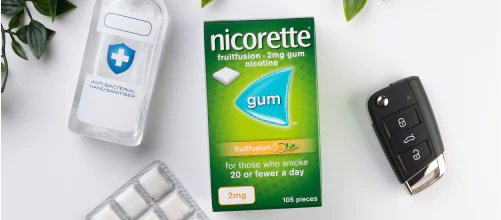- How smoking affects women’s and men’s fertility
- Smoking and women’s fertility
- Smoking and men’s fertility
- Smoking and conception
- IVF and smoking
- Smoking and pregnancy
- Smoking and impotence
- Passive smoking and fertility
- Can quitting smoking increase my fertility?
- Begin your journey to a smoke-free future with Nicorette
Chances are you already know some of the health problems that are linked with smoking – it may be why you’ve taken the life-changing decision to quit. But did you know it could also affect your fertility?
If you’re a man who smokes then it could leave you with a lower sperm count, while some evidence suggests women who smoke have double the risk of infertility as non-smokers.
The good news is that stopping smoking could reverse some of the negative effects and increase your chances of bringing a little bundle of joy into the world.
Read on to learn more about how smoking affects your fertility, how quitting can improve your chances of having a happy and healthy baby – and how Nicorette can support you on your journey.
How smoking affects women’s and men’s fertility
When it comes to fertility, there are a few different ways it can affect men and women.
Smoking and women’s fertility
Did you know?
If you smoke, your chances of getting pregnant could be cut by half each month.
Menopause occurs 1 to 4 years earlier for women who smoke (compared to non-smokers), according to some research.
Research also suggests that 1 in 5 babies born to mums who smoke have low birth weight, while it can also increase the risk of premature births.
Smoking and men’s fertility
Did you know?
Men who smoke often have a lower sperm count than those who don’t.
Some research shows male smokers are more likely to have a higher percentage of malformed sperm.
Men who smoke may be around three times as likely to experience erectile dysfunction than those who don’t.
If you want to start a family or grow your existing one, this could be the perfect motivation to start your quit journey today.
Smoking and conception

From the second you start trying to conceive, if one or both of you smoke, it could impact your plans to have a baby.
Most couples that have regular, unprotected sex (twice or three times a week) become pregnant within 12 months. For smokers though, the likelihood of getting pregnant can be cut by almost half each month.
And if you’re a woman who smokes, the likelihood of a fertilised egg implanting in your uterus may also drop. Smoking-linked fertility issues can affect women who already have children as well as those who are trying for a first baby.
IVF and smoking
Research has shown that smokers receiving IVF treatment can also experience a drop in fertility, pregnancy and live birth rates, while increasing the chance of miscarriages and ectopic pregnancies. You might just need more ovary-stimulating medication to be successful.
Smoking and pregnancy
Smoking when you’re pregnant can restrict the oxygen supply to your baby, meaning their heart has to beat harder.
Complications that smoking can cause during pregnancy and birth, include:
Tubal or Ectopic pregnancy – Nicotine can affect the function of your fallopian tube and mean a fertilised egg implants itself outside the womb.
Chromosomally unhealthy pregnancy – Women who smoke may be more likely to have a baby with a chromosomal irregularity, such as Down syndrome.
Premature birth – The likelihood of giving birth before the 37th week of pregnancy may increase, which could leave your baby with health problems.
Miscarriage and stillbirth – The chemicals in cigarettes can cause slow foetal development and increase the chance of losing your baby or it being stillborn.
Low weight – On average, smokers’ babies are 200g (eight ounces) lighter, according to the NHS, which can cause health problems during and after labour.
Even smoking just a few cigarettes during pregnancy can increase your risk of complications and health issues10. Smoking while pregnant can also increase the chance of cot death by 25%.
Smoking and impotence
Smoking can narrow your blood vessels, which makes getting an erection more difficult and can lead to erectile dysfunction.
Cigarettes can also damage the quality and quantity of your sperm3. This can mean you have fewer, lazier sperm that make less of an effort to move towards any eggs.
Passive smoking and fertility
Second-hand smoke can also reduce your chances of conceiving, as well as affect your baby before or after birth.
Passive smoking is understood to impact fertility in many of the same ways as if you smoked yourself – increasing the risk of sudden infant death syndrome (SIDS or cot death), having an underweight baby and other difficulties around childbirth.
Can quitting smoking increase my fertility?
Lots of factors have an impact on fertility but quitting smoking could help. Women who stop smoking typically don’t take longer to get pregnant than those who have never lit up a cigarette in their life. Quitting is also believed to help improve your chances of conceiving if you’re going through IVF treatment.
Cutting out cigarettes may help improve the condition of your womb lining, which could, in turn, increase your chances of getting pregnant quicker. Ideally, you should stop smoking around four months before trying for a baby – but stopping at any point is beneficial. In fact, if you stop smoking before becoming pregnant, your risks can drop to the same level as someone who has never smoked before.
For a man, no matter how long you’ve been a smoker, as soon as you stop your sperm will start to become healthier, which could increase your chances of having a baby.
Begin your journey to a smoke-free future with Nicorette

Giving up smoking isn’t easy, but it’s one of the best things you can do to boost your chances of having a baby – and Nicorette can support you every step of the way.
All our products harness Nicotine Replacement Therapy (NRT) to help you through those difficult first days and weeks. You can choose between NRT, including Nicorette products that work to reduce withdrawal symptoms and quickly satisfy any cravings to help you leave cigarettes behind.
NRT products, like Nicorette products, provide a low level of nicotine with none of the carbon monoxide, tar and other chemicals that can affect your fertility. Patches release nicotine slowly, while sprays, gum and lozenges provide quick release to reduce cravings.
When you feel the need for a cigarette, simply use one of these Nicorette products to lessen your cravings and relieve withdrawal symptoms. Then reduce your usage over time on your way to becoming completely smoke-free.
Find the right Nicorette product for you to start your journey to a smoke-free future today.




